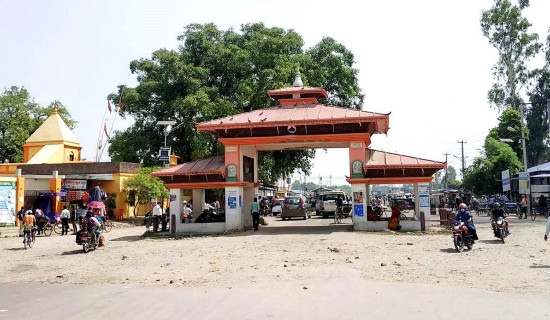- Thursday, 26 February 2026
Ensure Justice To Chetan's Widow
Of late, Nepali society has been rocked by a series of corruption scandals, height of impunity and communal violence. These not only imply the bad governance and disregard for rule of law but also the detrimental undercurrents that challenge the edifice of democratic and harmonious society envisioned by the constitution. Nepali society has often been described as multi-lingual, multi-ethnic, multi-cultural and multi-religious but these cohesive values are now under attack as social, economic and cultural fault-lines are emerging as recipe for potential conflict. What is more worrying is the new surge of anti-systemic forces that threaten to dismantle the new constitutional project drawn up by the elected deputies in 2015.
A true democratic society can hardly thrive in a state of impunity. During the raging conflict Nepal saw in mid-1990s, the dysfunctional state mechanisms often stumbled in maintaining law and order, which gave rise to the lawlessness and widespread insecurity among the people. But in the normal period, impunity can’t be accepted on any pretext because state apparatuses are functional and capable to deal with the criminal cases effectively. Following the promulgation of the constitution, the nation is geared towards consolidating federal democratic republic that is expected to ensure justice and fairness to the citizens without political bias. Failure to live up to public hope breeds mass frustration and encourages the anti-systemic elements to push through their agenda.
Constitutional conduct
There has been a tendency of heaping praise on the constitution but there is no strong resolve to embrace the constitutional conduct and morality. Three weeks ago, the nation observed the Constitution Day amid fanfare but the government’s decision to give amnesty to murder convicts on the occasion has dragged it into controversy. President Ramchandra Poudel has pardoned 670 prisoners. Of them, 170 were involved in murder cases. Around 134 of them have not completed even half of their prison term. Around 35 criminals, who were jailed for their attempted murder, were also released. Of them, 27 had finished 60 per cent of their total imprisonment period and eight had spent half of their jail term. The existing criminal law has put the punishment of life sentence on negative list, which means those serving life-imprisonment can’t enjoy amnesty.
Article 276 of the constitution states that ‘The President may grant pardon to persons convicted, and suspend, commute, or reduce any sentence imposed by any court, judicial or quasi-judicial bodies or administrative officer or authority.’ This provision applies to those offenders who have completed half of their jail term and improved conduct in the prison. As said earlier, this constitutional arrangement does not apply to the murder convicts who are slapped life sentence (20 years). Now the Office of President has landed in hot water after granting clemency to Yograj Dhakal, aka Regal, who was serving life sentence for his involvement in the murder of Chetan Manandhar of Banke. Legal experts have said that Article 276 has been grossly violated while pardoning Regal, who had to serve remaining 12-year jail term. He is described as a notorious gang leader and the then president of regional committee of Tarun Dal, the youth wing of ruling Nepali Congress.
Regal was a mastermind behind the gruesome murder of Chetan in broad daylight in Nepalgunj on July 13, 2015. A bench of the then Banke District Court Judge Bishnu Subedi had convicted him for murder and handed a life sentence with confiscation of all his properties in April 2019. Regal had been involved in illegally extorting money (forceful donation collected weekly) from buses operating from India. His gang murdered Chetan when it faced obstacle in collecting money. The District Court had slapped life term on four of its gang members, 10-year jail term on one, five-year term on one and three-year term on seven for their role in the killing. Upon his release from jail in Dang, Regal and his gang members welcomed him with garland and vermillion, and organised a parade up to Nepalgunj. A show of strength in favour of the perpetrator has terrified the victim's family members. They have come to Kathmandu in search of justice and physical security.
Hunger strike
Bharati Manandhar, Chetan's widow, has started a fast-unto-death at Maitighar from Wednesday, demanding justice for her husband. She said she was ready to sacrifice herself and would fight until the culprit is resent to prison. She has also knocked the door of Supreme Court and filed a petition against the presidential clemency to Regal. Responding to her writ, a bench of Justice Manoj Kumar Sharma has issued a show cause notice to the government, ordering the defendants, including the Office of the President, to furnish a written reply by October 11. A full bench will hear the case on October 12. The court has also instructed the government to ensure security to the victim's family.
The government's decision to grant amnesty to Regal has triggered public uproar, mocking the rule of law, principle of justice and human rights. Many see this as the blatant abuse of the President's constitutional right to pardon the prisoners. However, this is not the first time the constitution has been trampled on. In 2018, former President Bidya Devi Bhandari granted pardon to Bal Krishna Dhungel, a murder convict. Some months back, the incumbent President had granted clemency to Resham Chaudhary, a convict in the 2015 Tikapur massacre. Impunity and anarchy spread in the society if the criminals with political connection are pardoned. The President should also use his wisdom and discretion while granting pardon to the jailbirds. The Office of President should take cognizance of legal provision in doing so and must be cautious that such an act of clemency will not rub salt in the wound of the victims.
(The author is Deputy Executive Editor of this daily.)
















